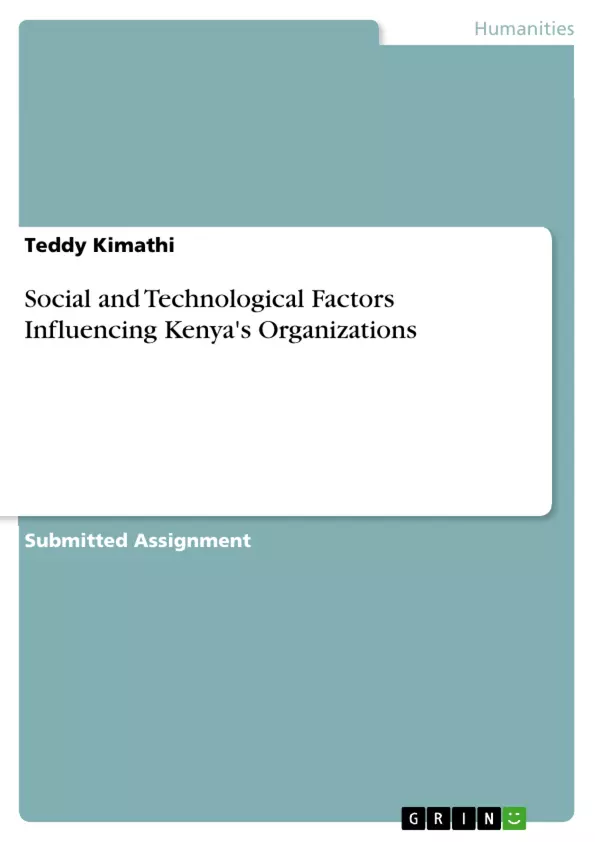This paper discusses social and technological factors which are influencing Kenya's organizations, how culture influence our perceptions toward a particular/certain business organization, and whether human resource managers should consider one's personality as a critical job performance factor.
The paper is sub-divided into three questions. Students studying Organization Behavior, Human Resource Management, Economics, and Strategic Management, can gain a lot of knowledge from this work.
Inhaltsverzeichnis (Table of Contents)
- Social and technological factors which are influencing Kenya's organizations
- Social forces
- Pollution
- Changing values
- Poverty
- Employment and education
- International financial institutions' emphasis on sustainable development
- Change in the people's lifestyle and living standards
- Technological forces
- Information and communication technologies in distance education
- Environmental concerns
Zielsetzung und Themenschwerpunkte (Objectives and Key Themes)
This text explores the social and technological factors that are shaping Kenya's organizations. It examines how these forces are influencing business practices and the overall economic landscape of the country.
- Impact of pollution on Kenyan organizations
- Evolving values and their effect on business practices
- Role of poverty in influencing organizational strategies
- Relationship between technology and education in Kenya's workforce
- Significance of sustainable development in contemporary Kenyan organizations
Zusammenfassung der Kapitel (Chapter Summaries)
- Pollution: This chapter discusses the growing awareness of environmental pollution in Kenya and how organizations are being impacted. It examines the historical context of pollution, the challenges it presents, and the role of government and businesses in mitigating its effects.
- Changing values: This section explores how Kenyan values have shifted over time, particularly in response to pollution, poverty, and other societal changes. It examines how these changing values are impacting organizational behavior and consumer expectations.
- Poverty: This chapter focuses on the impact of poverty on Kenyan organizations. It examines the factors that contribute to poverty, its effects on individuals and families, and the role of organizations in addressing poverty through job security, fair wages, and partnerships with microfinance institutions.
- Employment and education: This section explores the relationship between education, employment, and Kenya's economic development. It examines the changing demands of the workforce due to technological advancements and the importance of skilled workers in driving economic growth.
- International financial institutions' emphasis on sustainable development: This chapter discusses the concept of sustainable development and its influence on Kenyan organizations. It examines how sustainable development is framed in the context of global capitalism and its implications for environmental and social issues.
- Change in the people's lifestyle and living standards: This section explores the challenges posed by poverty, illiteracy, and HIV/AIDS to efforts to address the needs of an aging population in Kenya. It examines how these challenges are impacting organizational costs and the role of government in establishing policies to address them.
- Information and communication technologies in distance education: This chapter explores the role of information and communication technologies (ICT) in distance education in Kenya. It examines the benefits of ICT for democratizing education, the challenges faced by developing countries in adopting it, and the political, economic, cultural, and technological factors involved.
- Environmental concerns: This section explores the growing awareness of environmental concerns, particularly climate change, and the need for technological innovation to address them.
Schlüsselwörter (Keywords)
Key concepts and terms explored in this text include pollution, changing values, poverty, employment, education, sustainable development, lifestyle, living standards, information and communication technologies, distance education, and environmental concerns. These themes highlight the interplay between social and technological forces in shaping the landscape of Kenyan organizations.
Frequently Asked Questions
What social factors are currently influencing Kenyan organizations?
Key social forces include pollution, changing societal values, poverty, education levels, and shifts in living standards and lifestyle.
How does poverty impact organizational behavior in Kenya?
Poverty influences strategies regarding job security, fair wages, and the need for partnerships with microfinance institutions to address the needs of the workforce.
What role does technology play in Kenya's education system?
Information and communication technologies (ICT) are pivotal in democratizing education through distance learning, despite challenges in adoption.
Why is sustainable development a priority for Kenyan businesses?
International financial institutions place a heavy emphasis on sustainable development, forcing local organizations to integrate environmental and social concerns into their strategies.
Should HR managers consider personality in job performance?
Yes, the paper discusses whether personality should be treated as a critical job performance factor during the hiring and management process.
- Citar trabajo
- Teddy Kimathi (Autor), 2007, Social and Technological Factors Influencing Kenya's Organizations, Múnich, GRIN Verlag, https://www.grin.com/document/380761



